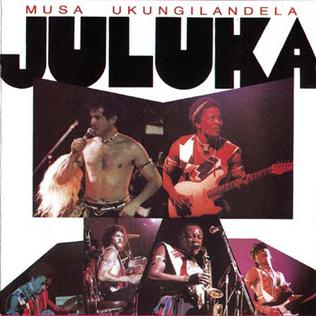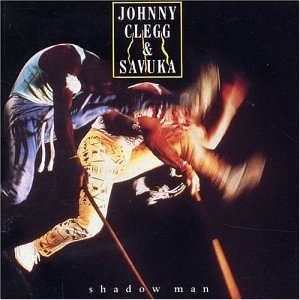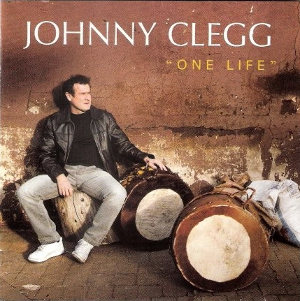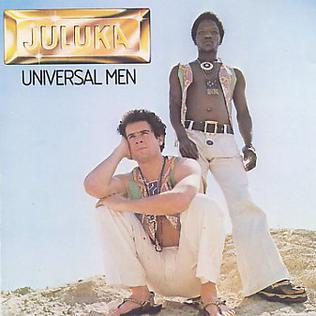
Jonathan Paul Clegg, was a South African musician, singer-songwriter, dancer, anthropologist and anti-apartheid activist.
Mbaqanga is a style of South African music with rural Zulu roots that continues to influence musicians worldwide today. The style originated in the early 1960s, and blends traditional African vocal styles and melodies with European and American popular music.
Maskandi is a form of Zulu folk music, originally associated with migrant workers, that is evolving with South African society. Often characterised by a picking guitar style which draws on a variety of historical influences it also has an important social function with players being given sanction to publicly criticise powerful people.

Third World Child is a studio album by South African artist Johnny Clegg and his band Savuka, released in 1987 and produced by Hilton Rosenthal.

Musa Ukungilandela is a studio album from Juluka, a South African band led by England-born Johnny Clegg and the Zulu Sipho Mchunu.

Shadow Man is a studio album from South African artist Johnny Clegg and his band Savuka.

Cruel, Crazy, Beautiful World is a studio album from South African artist Johnny Clegg and his band Savuka.
Heat, Dust and Dreams is a studio album by South African artist Johnny Clegg and his band Savuka, released in 1993, produced by Hilton Rosenthal, co-produced by Bobby Summerfield. The album received a 1993 Grammy Award nomination for Best World Music Album.
Juluka was a South African band formed by the late Johnny Clegg and Sipho Mchunu. Juluka means "sweat" in Zulu, and was the name of a bull owned by Mchunu. The band was closely associated with the mass movement against apartheid.

Savuka, occasionally referred to as Johnny Clegg & Savuka, was a multi-racial South African band formed in 1986 by Johnny Clegg after the disbanding of Juluka. Savuka's music blended traditional Zulu musical influences with Celtic music and rock music that had a cross-racial appeal in South Africa. Their lyrics were often bilingual in English and Zulu and they wrote several politically charged songs, particularly related to apartheid. Some better-known Savuka songs include "Asimbonanga", and "Third World Child", from their 1987 album Third World Child. Band percussionist Dudu Zulu was killed in 1992; their song "The Crossing" was a tribute to him.

Ubuhle Bemvelo is a studio album from Juluka, a South African band led by Johnny Clegg and Sipho Mchunu. It was first released in 1982.
Sipho Mchunu is best known for his work in the band Juluka from the 1970s to the 1980s.

Scatterlings is a studio album by Juluka, a South African band led by Johnny Clegg and Sipho Mchunu. It was released in 1982.

One Life is a studio album by South African artist Johnny Clegg, released in 2006. Johnny Clegg, Renaud and Claude Six are listed as the executive producers in the liner notes. The CD and liner notes - with numerous typos - were produced by Marabi Productions.

Work for All is a studio album from Juluka, a South African band led by Johnny Clegg and Sipho Mchunu. It was first released in 1983 and rapidly achieved major success in South Africa where it is now remembered as a classic album in the history of South African music.

The Good Hope Concerts is a live album from Juluka, a South African band led by Johnny Clegg and Sipho Mchunu. It was first released in 1986. It was recorded at the Good Hope Centre in Cape Town. The concerts were Clegg's first major successes in Cape Town and were promoted by local record label Mountain Records.

Universal Men is the debut album from Juluka, a South African band led by Johnny Clegg and Sipho Mchunu. It was first released in 1979 and has acquired the status of a classic album in the history of South African music.

Stand Your Ground is a 1984 album by Juluka, a South African band led by Johnny Clegg and Sipho Mchunu. The album was distributed by Warner Bros. Records in select countries of Europe and the Americas. The album debuted four new Juluka songs: "Kilimanjaro", "Look into the Mirror", "Fever", and "Crazy Woman". The six remaining tracks are songs that were previously released on Juluka's 1983 album, Work for All.
"Scatterlings of Africa" is a 1982 song by the South African band Juluka, first released on their 1982 album Scatterlings. It was re-released in 1987 by Juluka's successor band Savuka on Third World Child. The song was a commercial success, charting in France and the United Kingdom. Its lyrics explore the "myriad dislocations" experienced by South Africa. The rousing and upbeat music incorporated Zulu influences. The song introduced the music of Johnny Clegg, the cofounder of Juluka and Savuka, to Western audiences.

"Asimbonanga", also known as "Asimbonanga (Mandela)", is an anti-apartheid song by the South African racially integrated band Savuka. It was first released as a 12" single in 1986, and then included in their 1987 album Third World Child. It alluded to Nelson Mandela, imprisoned on Robben Island at the time of song's release, and other anti-apartheid activists. "Asimbonanga" is a Zulu phrase that may be translated as "We have not seen him". It was well received, becoming popular within the movement against apartheid, and was covered by several artists including Joan Baez and the Soweto Gospel Choir.










